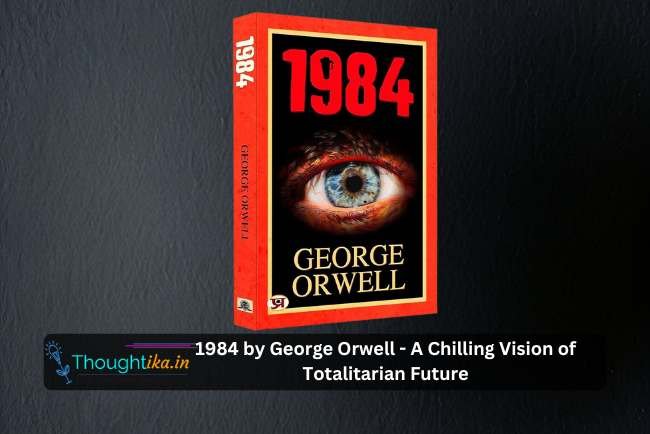1984 by George Orwell - A Chilling Vision of Totalitarian Future
n a world of perpetual war, omnipresent government surveillance, and crushing political control, George Orwell's masterpiece "1984" follows Winston Smith, a man who dares to dream of freedom in a society where independent thought is a crime.

Quick Facts
- Author: George Orwell
- Published: 1949
- Genre: Dystopian Fiction
- Reading Time: ~7 hours
- Pages: 328
- Notable Awards: Retrospectively chosen by Time Magazine as one of the 100 best English-language novels from 1923 to 2005
Overview
In a world of perpetual war, omnipresent government surveillance, and crushing political control, George Orwell's masterpiece "1984" follows Winston Smith, a man who dares to dream of freedom in a society where independent thought is a crime. Published in 1949, this prophetic novel has given us terms like "Big Brother," "thoughtcrime," and "Newspeak" that have become part of our modern lexicon.
Key Themes
1. Totalitarian Control
The novel explores how a government can maintain power through:
- Surveillance ("Big Brother is watching you")
- Manipulation of language (Newspeak)
- Control of information (Memory hole)
- Psychological manipulation
2. The Power of Information
Orwell demonstrates how controlling information means controlling reality:
- The Ministry of Truth constantly rewrites history
- Facts become malleable
- Reality becomes whatever the Party says it is
3. Individual Freedom vs Collective Control
The story examines:
- The human spirit's resistance to oppression
- The power of love as an act of rebellion
- The fragility of individual identity under extreme pressure
Plot Summary
Part One: The World of Oceania
We meet Winston Smith, a low-ranking party member who works in the Ministry of Truth, rewriting history to match the Party's current narrative. Despite the constant surveillance, Winston harbors heretical thoughts and begins keeping a diary—an act punishable by death.
Part Two: Love as Rebellion
Winston begins a forbidden relationship with Julia, a fellow party member. Their love affair becomes an act of political rebellion, as they find ways to meet in secret and dream of freedom from the Party's control. They seek out the resistance movement led by the mysterious Emmanuel Goldstein.
Part Three: Room 101
The lovers are eventually caught and separated. Winston is taken to the Ministry of Love, where O'Brien, a high-ranking party member, subjects him to months of psychological torture. The final test comes in Room 101, where each prisoner faces their worst fear.
Literary Analysis
Orwell's prose is deliberately stark and clinical, reflecting the bleakness of the world he creates. His attention to detail in building this dystopian society is remarkable, from the way language is controlled through Newspeak to the subtle psychological manipulation of the population through doublethink.
Impact and Relevance Today
The novel's influence extends far beyond literature:
- Terms like "Big Brother" and "thoughtcrime" have entered common usage
- Its warnings about surveillance and privacy remain relevant
- The concept of "alternative facts" echoes Orwell's concept of doublethink
- Modern concerns about technology and privacy often reference the novel
Notable Quotes
"War is peace. Freedom is slavery. Ignorance is strength."
"Who controls the past controls the future. Who controls the present controls the past."
"If you want a picture of the future, imagine a boot stamping on a human face—forever."
Critical Reception
When first published, "1984" was seen as a warning about totalitarian communism. Today, it's viewed more broadly as a cautionary tale about any form of totalitarian control, whether from governments or corporations. The novel has consistently been praised for its:
- Prophetic vision
- Political insight
- Psychological depth
- Lasting influence on popular culture
Reading Guide
Who Should Read This Book
- Political science enthusiasts
- Fans of dystopian fiction
- Anyone interested in surveillance and privacy issues
- Students of 20th-century literature
- Readers interested in psychological manipulation and control
Reading Experience
The book can be challenging due to its:
- Dense political themes
- Disturbing content
- Complex psychological elements However, its compelling narrative and important message make it essential reading.
Final Thoughts
"1984" remains startlingly relevant in our era of surveillance cameras, data collection, and political manipulation. Its warning about the fragility of truth and freedom in the face of power continues to resonate. While the year 1984 has come and gone, Orwell's masterpiece continues to serve as a crucial reminder of the importance of individual freedom, truth, and human dignity.
Have you read "1984"? What aspects of the novel do you find most relevant to our current world? Share your thoughts in the comments below.
Next week: We'll be exploring Ray Bradbury's "Fahrenheit 451" - another classic dystopian novel with powerful messages for our time.
What's Your Reaction?
















